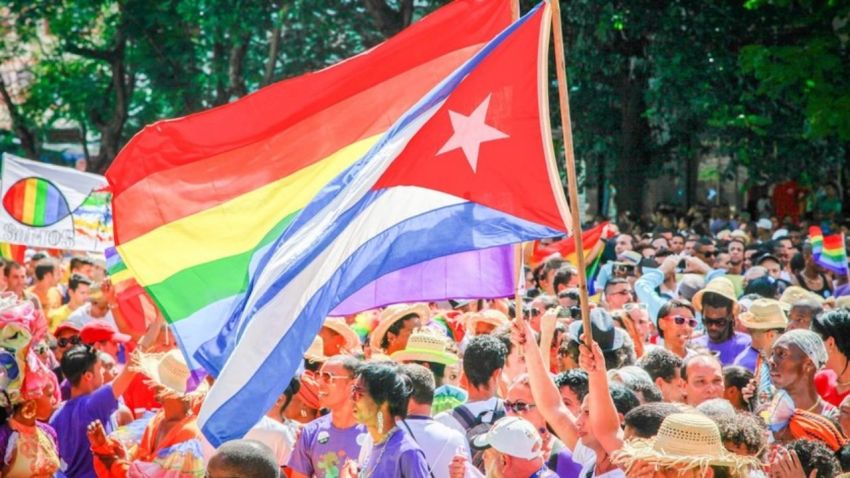
A majority of Cubans voted in favour of a new families code (Código de las Familias) on September 25 that allows same-sex couples to marry and adopt children.
Dubbed the world’s most inclusive and progressive code, the 100-page document expands the definition of the family beyond the hetero-normative conception, promotes gender equality, enshrines women’s rights and protects the role of grandparents and significant others in family relations.
The new code was approved by 66.9% to 33.1%, National Electoral Council (CNE) president Alina Balseiro Gutiérrez told official news media. The new code had to receive more than 50% of valid votes to be made into law.
The votes were cast at a national referendum conducted by the CNE — only the fourth such referendum since the 1959 revolution — and the first time that a referendum on a code has been held in Cuba.
Cuba is the first country in the world to submit a families code to popular consultation and referendum.
The consultation involved more than 79,000 town hall-style neighbourhood meetings, updating by dozens of experts, debate in various forums, and provisional approval by the country’s legislature, subject to the result of the referendum.
Six million Cubans voted in the referendum. All citizens over 16 years of age — more than 8 million — were eligible to vote. More than 22,000 Cuban citizens living abroad voted on September 18. The high voter turnout indicated the degree of interest in the code and strong civic commitment of the Cuban people.
There were 24,860 polling stations, 224 of them located in hospitals, airports, hotels and places with a large concentration of people to help access to the vote. Some 1,823 polling stations were in private homes.
Widespread support
A major supporter of the new families code was Mariela Castro, director of Cuba’s National Center for Sex Education and a promoter of rights for same-sex couples. Castro is the daughter of former Cuban president Raúl Castro and the niece of his brother, revolutionary and former president Fidel Castro.
Cuban President Miguel Díaz-Canel tweeted on the day of the referendum that it was “A day to change ‘everything that needs to be changed’ in family law in Cuba.” He previously described the referendum as a civic act of great duty to the country.
After the vote, Díaz-Canel tweeted that justice has been done and a debt paid off with several generations who had been waiting for years for a law based on respect, love and affection. “Starting today, we will be a better nation,” he said.
The code imposes no particular family model, recognising all families and providing them with guarantees.
It replaces the 1975 code, which has been overtaken by new family structures and social changes. The 1975 code defined marriage as “the voluntarily established union between a man and a woman” and makes no provision for same-sex marriage.
Cuba’s 2019 Constitution, when adopted, made no express provision for same-sex marriage, leaving the issue to be decided in a new families code after a popular consultation and a referendum.
Cuba’s National Assembly of People’s Power (ANPP) approved the wording of the draft new code in December last year to be submitted for popular consultation.
More than 150,000 submissions were made on the new code between February and April by electoral authorities, jurists, experts, students, professionals and ordinary Cubans. People submitted about 300,000 suggestions.
About 61% of Cubans who made submissions were in favour of same-sex marriage and the other proposed changes.
The CNE gave its summary of the popular consultation, including statistical data, to the ANPP in May.
Version 25 of the families code was presented, reflecting the final results of the public consultation and including changes to 49% of the articles. That version became Law No.156 when the ANPP unanimously approved it on June 22, subject to final approval by the referendum.
More rights
Along with allowing same-sex marriage, the code prohibits child marriage and permits financial agreements before marriage.
The code allows same-sex couples to adopt children and enables assisted human reproduction techniques, such as in vitro fertilisation and surrogate pregnancies.
The code also: allows for shared parental rights among extended and non-traditional family structures, such as grandparents, step-parents and surrogate mothers; protects communication between grandparents and grandchildren in the event of divorce; extends labour rights to those who care full-time for children, the elderly, or people with disabilities; and gives children greater participation in decisions that affect them.
The code promotes equal sharing of domestic responsibilities, confers a right to a family life free from violence and codifies domestic violence penalties, including preventing abusers from asking for custody of their children.
Cuba is already a front-runner in women’s rights in Latin America and the Caribbean — women head up nearly 50% of households and make up 60% of professionals. Cuban women have free access to abortion and can claim up to two years maternity leave.
Cuban justice minister Oscar Silvera Martínez said the code “protects human dignity, all family law institutions, eliminates any vestige of discrimination in the family sphere and rejects violence”.
Before the referendum, Roman Catholic bishops exhorted Cubans to vote according to “conscience, faith, convictions and principles”.
Roman Catholic Church and evangelical church groups strenuously opposed the code’s provisions relating to same-sex marriage, the legal adoption of children by same-sex parents, human reproduction techniques for same-sex couples, and in vitro fertilisation.
However, churches welcomed other changes effected by the code, including penalties for domestic violence and recognition and protection of the rights of grandparents.